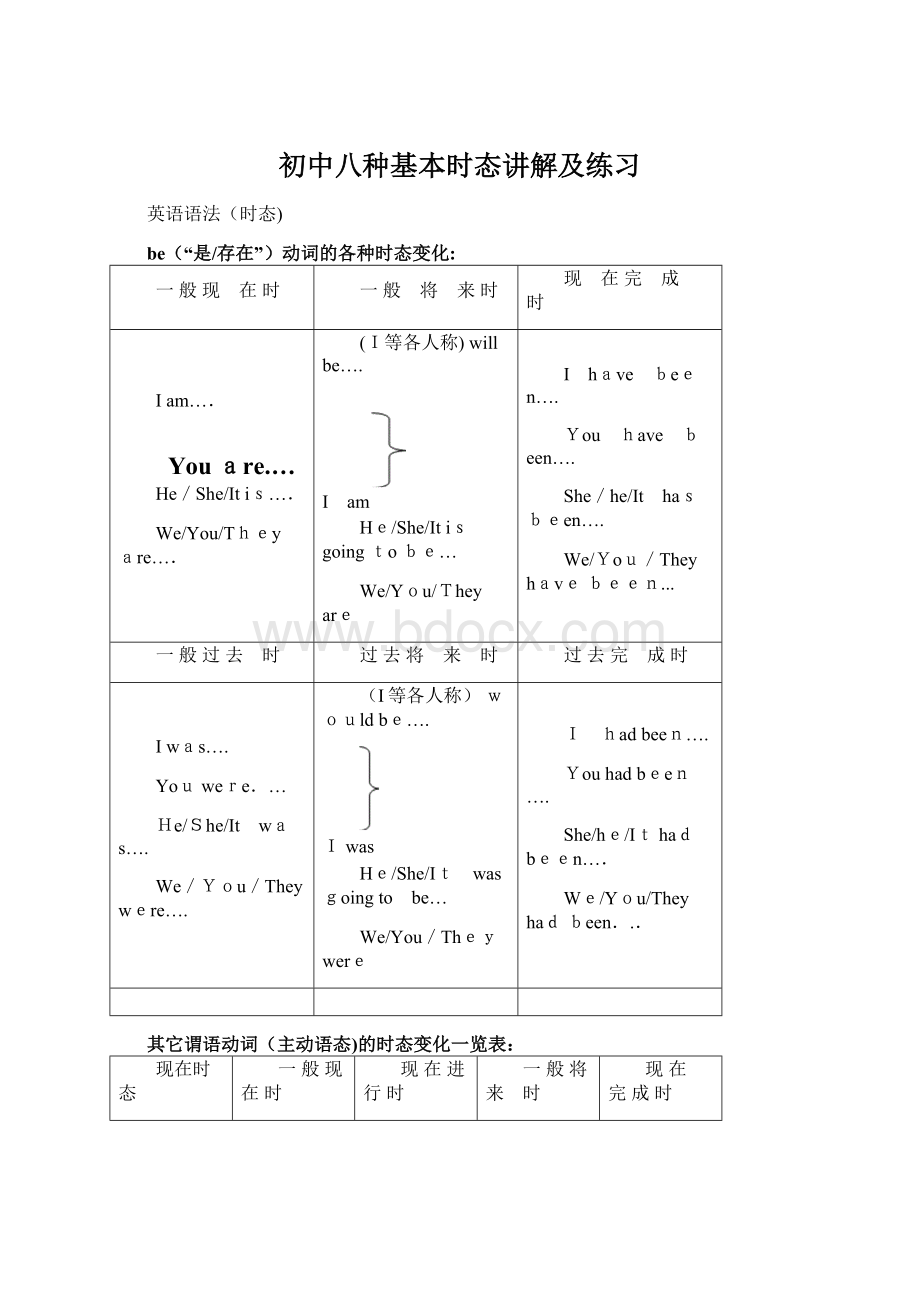初中八种基本时态讲解及练习.docx
《初中八种基本时态讲解及练习.docx》由会员分享,可在线阅读,更多相关《初中八种基本时态讲解及练习.docx(11页珍藏版)》请在冰豆网上搜索。

初中八种基本时态讲解及练习
英语语法(时态)
be(“是/存在”)动词的各种时态变化:
一般现 在时
一般 将 来时
现 在完 成 时
Iam….
Youare.…
He/She/Itis….
We/You/They are….
(I等各人称)will be….
I am
He/She/Itis goingtobe…
We/You/They are
I have been….
You have been….
She/he/It hasbeen….
We/You/They havebeen...
一般过去 时
过去将 来 时
过去完 成时
Iwas….
Youwere.…
He/She/It was….
We/You/Theywere….
(I等各人称)wouldbe….
Iwas
He/She/It was goingto be…
We/You/They were
I hadbeen….
Youhadbeen….
She/he/Ithad been….
We/You/They hadbeen...
其它谓语动词(主动语态)的时态变化一览表:
现在时态
一般现在时
现在进行时
一般将来 时
现在 完成时
谓语动词构成
动词用原形(单三加s/es)
(问句和否定句借用助词do /does)
am
is +动词-ing
are
will +动词原形
am
is +goingto+动词原形
are
have+过去分词
has
过去时态
一 般过 去 时
过去进行时
过去将来 时
过去完 成时
谓语动词构成
动词用过去式
(问句和否定句借用助词did)
was
+动词-ing
were
would+动词原形
was+going to+动词原形
were
had+过去分词
[注意]在其它的时态中也存在类似问题,记住,关键是:
瞬间动词不能和表达一段时间的状语连用。
如:
HowlongmayIkeepthe book?
(这本书我能借多久?
)(句子中keep取代了borrow)
注意:
句型变化时,
否定句在am/is/are/will/have/has /was/were/had/would后面加not,而且not都可以缩写为n’t(am后面not不可以缩写);
疑问句将am/is /are/will/have/has/was /were /had /would提前到句首。
八种时态的具体用法:
(1)一般现在时:
表示现阶段经常或习惯发生的动作或存在的状态,或说明主语的特征。
①一般现在时句子中常有的时间状语:
often,usually,sometimes,always,every(day等),once/twice,a (week等),on(Sunday等),never,inthe(morning等)。
如:
They gotothePalaceMuseum onceayear.(他们每年去一次故宫)/
Theyoftendiscussbusinessinthe evening.(他们经常在晚上商谈生意)
②表示客观真理、事实、人的技能或现在的状态时句子里一般不用时间状语。
如:
Theearthturns roundthe sun.(地球绕着太阳转)/
Light travelsfasterthansound.(光传播比声音快)
③ 表示十分确定会发生(如安排好的事情)或按照时间表进行的事情,用一般现在可以表达将来,句子中可以有将来时间。
如:
Thetrainfor Haikou leavesat8:
00inthemorning.(开往海口的列车上午8点开车)
④ 在时间状语从句中(以when,after,before,while,until, as soonas等引导)和条件状语从句中(以if,unless引导),用一般现在时代替一般将来时,句子可以有将来时间。
如:
Pleaseringmeupas soonasyouarriveinGermany.(你一到德国就给我打电话)/
Ifitrainstomorrow,wewill have tostayathome.(如果明天下雨我们就只好呆在家)
⑤一般现在时用于倒装句中可以表示正在发生的动作,动词以come, go为主。
如:
Herecomesthe bus. (车来了)/
Theregoes the bell.(铃响了)。
(2)一般过去时表示过去某时发生的动作或状态,这种动作或状态可能是一次性,也可能经常发生。
①表示过去具体时刻发生的一次性动作时,时间状语有:
at(eight)(yesterdaymorning),(tenminutes)ago,when引导的时间状语从句。
如:
Igotupat6:
00 this morning.(我是早上六点钟起床的)/
LittleTombrokethewindowathalfpast ninethismorning.(小汤姆今天早上九点半把窗子打破了)/
Whenhewent intotheroom,hesawastrangertalkingwithhisfather.(他走进房间时发现一个陌生人正和他父亲谈话)
② 表示过去一段时间内不知何时发生的一次性动作时,时间状语有:
yesterday, last (year等),in(1998等)。
如:
Hecametoour cityin theyear 2000.(他2000年来到我们市)
③表示过去一个阶段中经常发生的事情时,时间状语有:
last…,in…, from…to…, for(10years),often,usually,sometimes, always,never等。
如:
MrJackson usually went toeveningschools whenhewasyoung./
Everydayhewenttothe rich man and borrowed booksfromhim.
④讲故事、对过去经历的回忆、双方都明白的过去事件等一般用过去时,而且经常省略时间状语。
如:
I happenedtomeet Roseinthestreet.(我正好在街上遇到露西)
(3)一般将来时 表示将来某一时刻或经常发生的动作或状态。
①一般将来时的时间状语有:
tomorrow,this (afternoon),next(year),oneday,now,soon,someday,sometime,inthefuture,when引导的从句等。
②用will构成的将来时,表示动作与人的主观愿望无关。
“shall”用于第一人称,“will”用于所有人称。
如:
Iwillgraduatefromthisschoolsoon.(我很快就要从这所中学毕业了)/
Youwillstayaloneafter I leave.(我走了之后你就要一个人过了)
③“am/is/aregoingto+动词原形”表示打算或准备要做的事情,或者主观判断即将要发生的事情,而“am/is/areto +动词原形”表示安排或计划中的动作。
如:
Aman told themthat thewomanwastogivebirthtothespecialbaby.(有一个人告诉他们那个妇女就会生下那个特别的男孩)/
It’sgoingtorainsoon.(天快要下雨了)
④表示一个人临时决定要做某事,可以用will表达。
如:
Iwill go tothe labto getsome chemicals(化学药剂). SopleasewaituntilIreturn.(我要到化学实验室去取些药品,请等我回来)
⑤ 现在进行时、一般现在时也可以表示将来。
(见相应时态)
⑥shall和will在口语的一些疑问句中相当于情态动词。
Shall一般与第一人称连用,will与第二人称连用。
如:
ShallwegotothezoonextSaturday?
(我们下周六去动物园好吗?
)/Willyouplease openthedoorforme?
(替我把门打开好吗?
)
⑦“beto+动词原形”表示按照计划将要发生的事情。
如:
An angelcametotellherthatshe was tohavethisspecial boy.
(4)现在进行时现在进行时表示现在正在进行的动作或是现阶段正发生而此刻不一定在进行的动作。
①现在进行时由“助动词be(am isare) +现在分词”构成。
②现在进行时的时间状语有:
now,this…,these…等,但经常不用。
如:
Whatare youdoingupinthetree?
(你在树上干什么?
)/
Iamwritingalong novelthesedays.(我最近在写一本长篇小说)
③表示即将发生的动作,一般指近期安排好的事情。
常见的动词有:
come,go,stay,leave, spend, do等。
如:
I’mcoming now.(我就来)/
Whatareyoudoing tomorrow?
(你明天干什么?
)/
Heis leavingsoon.(他就要走了)
(5)过去进行时过去进行时表示过去某一时刻或某阶段正在进行的动作。
① 过去进行时由“was(第一、三人称单数)或were(第二人称单数和各人称的复数)+现在分词”构成。
② 过去进行时的时间状语有:
then,at thattime,thistimeyesterday,at(eight)yesterday (morning),(ayear)ago, 以及由when引出的时间状语从句。
如:
He wascookingsupperthistimeyesterday.(昨天这个时候他正在做晚饭)/
ThelittlegirlwasplayingwithhertoywhenIsaw her.(我看到小女孩的时候她正在玩玩具)
③用于宾语从句或时间状语从句中,表示与主句动作同时进行而且是延续时间较长。
句子中通常不用时间状语。
如:
She sawit happenwhen shewaswalkingpast.(她路过时看到事情的发生)/
Theysangalotofsongswhiletheywerewalkingin thedarkforest.(他们在黑暗的森林里走时唱了很多歌)
(6)现在完成时 现在完成时表示一个发生在过去的、对现在仍有影响的动作,或表示开始在过去,并且一直延续到现在,甚至还可能延续下去的动作。
①在完成时由“助动词have(has)+动词的过去分词”构成。
②表示发生在过去的对现在仍有影响的动作时,时间状语有:
already,yet, just, once,twice,ever,never,threetimes, before等。
如:
Ihaveneverseensuchfinepicturesbefore.(我以前从来没有看过这么好的画)/
Hehasjustgone to England.(他刚去英国)
③表示在过去开始一直延续到现在(可能延续下去)的动作或状态时,时间状语有:
for (twoyears),since 1990, since(twoweeksago)和since引导的状语从句。
如:
Ihavebeenawayfrommyhometownforthirtyyears.(我离开家乡有30年了)/
UncleWanghasworkedinthefactorysinceitopened.(自从这家工厂开张,王叔叔一直在那儿工作)
④口语中have got往往表示have(有)的意思。
如:
Theyhavegotthousands ofbooks intheirlibrary.(他们图书馆有上万本书)
⑤havebeento与havegoneto的区别:
havegoneto(“已经去了”)表示人不在这里,have beento(“去过”)表示人在这里。
如:
--Where is MrLi?
–Hehasgone totheUK.(李先生在哪里?
他去了英国。
)/
--Do youknowsomething about Beijing?
–Yes,I havebeentoBeijingthree times.(你知道北京的情况吗?
是的,我去过那里三次。
)
(7)过去完成时过去完成时表示过去某一时间或某一动作发生之前已经完成的动作。
简言之,过去完成时所表示的时间是“过去的过去”。
①过去完成时由“助动词had+动词的过去分词”构成。
②过去完成时时间状语有:
by(yesterday),bythen,bytheendof(last…)或者由when,before等引出状语从句。
有时句子中会有already,just,once,ever,never等词语,也会有for…或since…构成的时间状语。
如:
Theyhadalready finishedcleaningtheclassroom when theirteachercame.(当老师来的时候他们已经打扫完了教室)/
Thewoman hadleftbeforeherealizedshe wasa cheat.(在他发觉那个妇女是个骗子时她已经走掉了)
③过去完成时常用于宾语从句中、after引导的从句中,或者从句是before引导的主句中。
如:
AfterI hadputonmyshoesandhat,Iwalkedintothedarkness.(我穿上鞋子戴上帽子走进了黑暗之中)/
Hesaidthathehad neverseen akangaroobefore.(他说他以前从来没有见过袋鼠)
(8) 过去将来时过去将来时表示在过去预计将要发生的动作或存在的状态。
①过去将来时由“助动词should(第一人称)或would(第二、三人称)+动词原形”构成。
在美国英语中,过去将来时的助动词一律用“would+动词原形”。
②过去将来时常由于宾语从句中,时间状语有:
later,soon,thenext(day).
③在时间状语从句和条件状语从句中不可以使用过去将来时,而应该使用一般过去时。
如:
Hepromised thathewouldpaymea lot if Ihelpedhimwiththeproject.(他答应付给我许多钱如果我帮助他搞那个项目)/
Everytime whenhe was free,hewouldsitdownandreadsomebooks.(以前每次只要他有空他就会坐下来看看书)
④表示纯粹的将来时用would或should,表示打算或主观认为的事情用was/were goingto (+动词原形)。
如:
Shetoldmeshe wouldbe18thenext month.(她告诉我她下个月就18岁了)/
She toldmethatshe wasgoingtohavea walk with herpetdog.(她告诉我她打算带她的宠物狗去散步)
⑤过去将来时还可以表示一个过去经常性的动作。
如:
Whenitrained intheday, hewould bringan umbrellawithhim.(白天下雨时他会随身带一把雨伞)
(9)现在完成进行时:
现在完成进行时指一个从过去就开始一直延续到现在并由可能继续下去的动作,它具有现在完成时和现在进行时双重特征,结构是:
“have/has+been+动词的现在分词”。
如:
Ihavebeenswimminginthe cold waterforabouttwohours.(我已经在冰冷的水里游了将近两个小时)/
Howlonghave youbeenwaitinghere?
(你在这里一直等了多久?
)
时态综合练习
(一)
1.SalesofCDshavegreatlyincreasedsincethe early1990s,when people________to enjoytheadvantages ofthisnewtechnology.
A. begin B.Began C.have begun D.had begun
2.Turnonthetelevision oropenamagazine andyou ________ advertisementsshowinghappyfamilies.
A.will oftensee B.oftensee C. areoftenseeing D.have oftenseen
3.—I hear Janehasgonetothe HolyIslandfor herholiday.
—Oh,hownice!
Doyouknowwhenshe________?
A.was leaving B.hadleft C.hasleft D.Left
4.—WhatwereyoudoingwhenTony phonedyou?
—Ihadjust finishedmyworkand________totake ashower.
A.hadstarted B.StartedC.havestarted D.wasstarting
5.I________younotto movemydictionary—nowIcan’t findit.
A.asked B.Ask C.wasasking D.hadasked
6.—HasSamfinishedhishomework today?
—Ihave noidea. He________itthismorning.
A.did B.has done C. wasdoing D.haddone
7.—What’sthat terrible noise?
—The neighbors________for aparty.
A.haveprepared B. arepreparing C.prepare D. willprepare
8.Now that sheisout of a job,Lucy________goingbacktoschool, butshehasn’t decidedyet.
A.had considered B.has beenconsideringC. considered D.is goingtoconsider
9.The teacher,with6girlsand8boysofher class, ________visitingamuseumwhen theearthquakestruck.
A.was B.were C.had been D.wouldbe
10.Thediscussion________alivewhenaninteresting topic wasbrought in.
A.wascoming B.hadcome C.hascome D. came
11.Becausetheshop________,alltheT-shirtsare soldathalfprice.
A.hascloseddown B.closeddown C. isclosing down D. hadcloseddown
12.Let’skeeptothe point orwe________anydecisions.
A. willneverreach B.havenever reachedC.neverreach D. never reached
13.My mindwasn’tonwhathe wassayingsoI’m afraidI________halfof it.
A.wasmissing B.hadmissed C.willmiss D.missed
14.—Youwere outwhenI droppedinatyourhouse.
—Oh,I________fora friend fromEnglandatthe airport.
A.was waiting B.hadwaited C. amwaiting D.has waited
时态综合练习
(二)
1. Shehasseta newrecord,thatis,thesalesof her